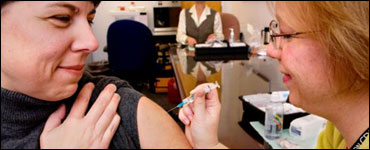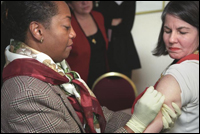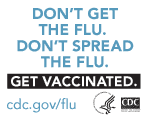CDC Features
CDC Helps Monitor Smallpox Vaccine Safety

The September 11, 2001 terrorist attacks in the United States raised concerns about the possible use of biological weapons such as smallpox. CDC helped prepare for such an attack by working with state and local health departments to vaccinate civilian health care response team members, so they could safely care for patients with smallpox.
CDC's Immunization Safety Office (ISO) took reports of medical problems among those who were vaccinated, and investigated them to find out if they were caused by the smallpox vaccine. The results of these studies were published on March 15, 2008 in a special supplement to the journal Clinical Infectious Diseases.
How Possible Medical Problems Were Reported
If a person who received a smallpox vaccine had medical problems afterward, a report was filed in the Vaccine Adverse Event Reporting System (VAERS). VAERS is a national vaccine safety system that accepts reports from the public on medical problems (called "adverse events") that may be associated with vaccines licensed in the United States. VAERS reports are monitored continually by scientists from CDC and the Food and Drug Administration.1

Risk of Heart Attacks
Of the first 37,901 people who received smallpox vaccines, 10 had heart attacks within four weeks of vaccination. Seven of the 10 people had three or more risk factors for a heart attack before vaccination, so the program stopped vaccinating people with more than two risk factors.
After people with three or more risk factors were excluded from receiving the smallpox vaccine, 6,638 more people were vaccinated, and none had heart attacks.2
Risk of Other Heart Problems
Scientists investigated the risk that people who are vaccinated against smallpox will have heart problems other than heart attacks. Investigators concluded that the risks are small, but that "future US smallpox vaccination programs should include education material, appropriate clinical follow-up, and adequate surveillance" to prepare for and respond to this risk.3
For More Information
- Vaccine Safety Emergency Preparedness: Smallpox
- Emergency Preparedness and Response: Smallpox
- Smallpox Vaccine Basics
- Smallpox Vaccination
References
1 Thomas TN, Reef S, Neff L, Sniadack MM, Mootrey GT. A review of the smallpox vaccine adverse events active surveillance system. Clinical Infectious Diseases 2008;46(S3):S212–S220.
2 Swerdlow DL, Roper MH, Morgan J, Schieber RA, Sperling LS, Sniadack MM, Neff L, Miller JW, Curtis CR, Marin ME, Iskander J, Moro P, Hightower P, Levine NH, McCauley M, Heffelfinger J, Damon I, Török TJ, Wharton M, Mast EE, Mootrey GT; Smallpox Vaccine Cardiac Adverse Events Working Group. Ischemic cardiac events during the Department of Health and Human Services smallpox vaccination program, 2003. Clinical Infectious Diseases 2008;46(S3):S234–S241.
3 Morgan J, Roper MH, Sperling L, Schieber RA, Heffelfinger JD, Casey CG, Miller JW, Santibanez S, Herwaldt B, Hightower P, Moro PL, Hibbs BF, Levine NH, Chapman LE, Iskander J, Lane JM, Wharton M, Mootrey GT, Swerdlow DL; Smallpox Vaccine Adverse Event Monitoring and Response Activity. Myocarditis, pericarditis, and dilated cardiomyopathy after smallpox vaccination among civilians in the United States, January–October 2003. Clinical Infectious Diseases 2008;46(S3):S242–S250.
Page last updated: March 17, 2008
Content source: Immunization Safety Office, Office of the Chief Science Officer
Content owner: National Center for Health Marketing
URL for this page: www.cdc.gov/Features/SmallpoxVaccine


